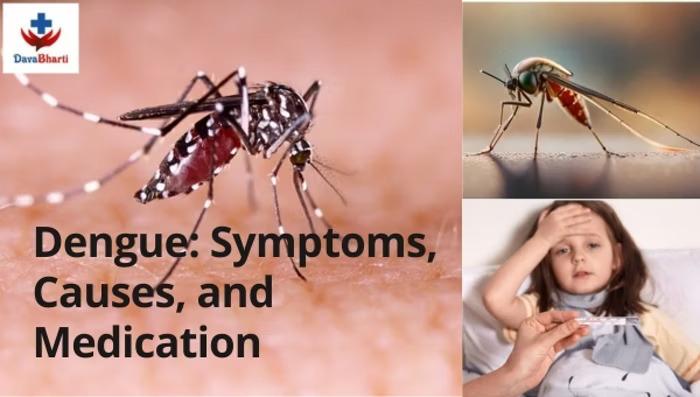Millions of people throughout the world suffer from the viral virus Dengue fever, which is spread by mosquitoes. The Aedes mosquito is the main vector for the Dengue virus, which is responsible for its cause. We shall look at the signs, causes, and treatment options for dengue here.
Symptoms:
Dengue symptoms usually occur 4–10 days after being bitten by an infected mosquito and can range in severity from mild to severe.. Common symptoms include a high fever, a severe headache, pain behind the eyes, joint and muscle pain, and a rash. Dengue can progress to a more severe form known as Dengue Hemorrhagic Fever (DHF) or Dengue Shock Syndrome (DSS), which are life-threatening conditions. Warning signs for severe Dengue include persistent vomiting, severe abdominal pain, bleeding gums, and rapid breathing. Early diagnosis and medical care are crucial to managing Dengue effectively.
Causes:
One of the four closely related Flaviviridae family members that transmit Dengue are DENV-1, DENV-2, DENV-3, and DENV-4. The main vectors for spreading the virus to people are Aedes mosquitoes, especially Aedes Aegypti and Aedes Albopictus. These mosquitoes are most active during the early morning and late afternoon, making those times particularly risky for contracting Dengue. Dengue is often prevalent in tropical and subtropical regions, where mosquito vectors thrive.
Medication and Treatment:
There is no specific antiviral medication to treat Dengue, so management focuses on alleviating symptoms, preventing complications, and providing supportive care. Here are some crucial elements of treating Dengue:
Hydration:
Adequate fluid intake is crucial. Severe dengue can lead to plasma leakage, causing shock and organ failure. Intravenous (IV) fluids may be required to maintain blood pressure and prevent dehydration.
Pain and Fever Relief:
Over-the-counter pain relievers like Acetaminophen (Paracetamol) can help manage fever and reduce pain. Avoid non-steroidal anti-inflammatory drugs (NSAIDs) like Aspirin or Ibuprofen, as they can increase the risk of bleeding in Dengue.
Close Monitoring:
Patients with Dengue should be closely monitored for any signs of deterioration, especially those at risk of developing severe Dengue. Early intervention is essential.
Rest:
Rest is vital during the recovery phase, as Dengue can be physically draining.
Vaccine:
In recent years, some countries have approved a dengue vaccine called Dengvaxia. This vaccine is intended for individuals aged 9-45 who live in areas with high dengue transmission. However, its use is subject to specific guidelines and recommendations by health authorities.
Diet during Dengue fever?
During Dengue fever, it's important to focus on a nutritious and easily digestible diet to support recovery. Consume plenty of fluids, including water, oral rehydration solutions, and coconut water, to prevent dehydration. Opt for soft, bland foods such as rice, plain pasta, boiled potatoes, and ripe bananas. Protein-rich foods like lean meats, fish, and tofu can aid in the healing process. Additionally, incorporate fruits rich in vitamin C, like oranges and papayas, to boost immunity. Avoid spicy, greasy, or overly seasoned foods, as they may exacerbate symptoms. Always consult a healthcare professional for personalized dietary advice during Dengue fever.
Conclusion
Dengue is a viral illness with a wide range of symptoms, caused by the Dengue virus and transmitted through Aedes mosquitoes. While there is no specific antiviral medication for Dengue, supportive care and management of symptoms, particularly hydration, are essential. Preventive measures, such as mosquito control, remain a critical part of Dengue control efforts.
Prevention
Preventing Dengue involves mosquito control and personal protection measures. Eliminate standing water to disrupt mosquito breeding sites. Use mosquito repellent, wear long-sleeved clothing, and use bed nets. Dengue vaccination may be available in some regions. Community awareness and public health initiatives also play a vital role in Dengue prevention.






